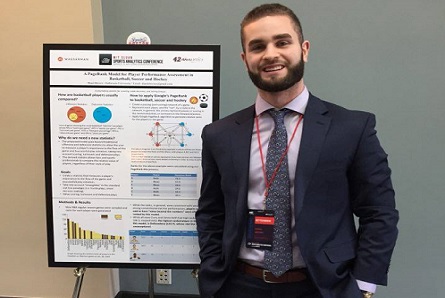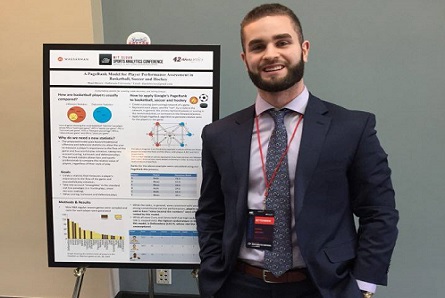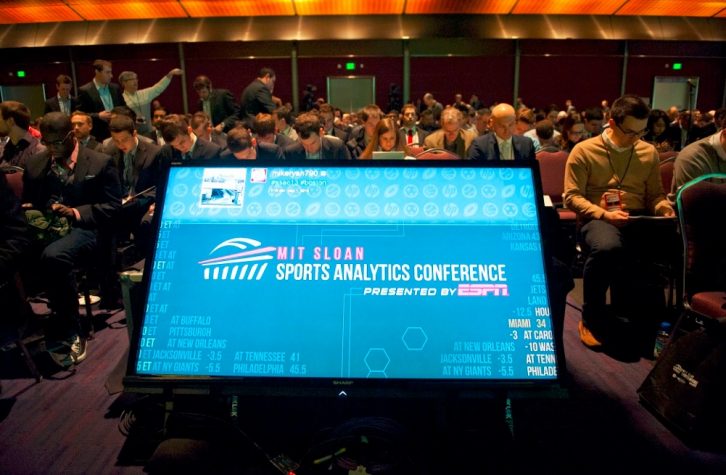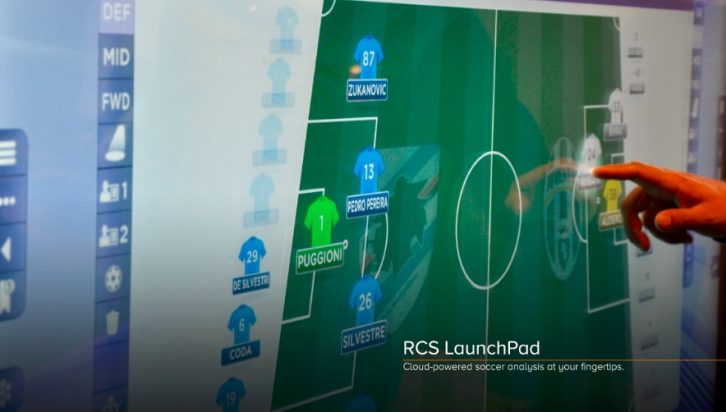Sports Analytics
Halifax student earns opportunities through sports analytics research
Mathematics student Shael Brown is venturing into the world of professional sports

caption
Shael Brown stands in front of his research poster at the MIT Sloan Sports Analytics Conference in Boston.
caption
Shael Brown presented his research at the MIT Sloan Sports Analytics Conference.Shael Brown recently presented at the world’s largest sports analytics conference. Brown loves sports and mathematics, and is about to find out if he can carve out a career connecting his two interests.
Sports analytics is the process of using data and statistics to help coaches, general managers and scouts make more informed decisions about players, in order to improve team performance.
Growing up as a soccer player and sports fan, Brown is as passionate about his analytics research as he is about the sports they apply to.
“I’ve been a sports fan for all my life and math has always been my thing,” Brown said. “So I picked up some reading material and it happened to make sense to fuse them together.”
Sports analytics conference
As a math and computer science student at Dalhousie University, Brown has developed a sports analytics model that can be used in soccer, basketball and hockey. His research earned him a spot at the MIT Sloan Sports Analytics Conference in Boston earlier this month. This annual event brings together sports industry professionals, along with researchers and students, to discuss the increasing role of analytics in sports.

caption
The MIT Sloan Sports Analytics Conference grows in size every year.Brown said he met some of the biggest executives in the National Basketball Association (NBA), including Mark Cuban, owner of the Dallas Mavericks; Bob Myers, general manager of the Golden State Warriors and Masai Ujiri, general manager of the Toronto Raptors.
Pitching to NBA executives
While watching a conference panel that included Ujiri and two other NBA general managers, Brown saw an opportunity open up.
“They were standing up there saying that the one statistic they don’t have is the one that goes beyond the stat-line,” Brown said. “(It’s) one that essentially measures the value a player brings beyond just rebounds, assists, points etc. I almost yelped because that’s what my statistic does.”
Brown realized he had to talk with these general managers about his research. He approached Ujiri with his idea after the panel concluded.

caption
This year’s conference had over 30 panels covering all major sports.Brown said he told Ujiri that he created a statistic that does exactly what Ujiri was looking for. Brown presented his research in a one-minute pitch.
“He said ‘alright, impress me. You’re on the clock,’” Brown said.
Brown said he was nervous, as Ujiri is the general manager of his favourite basketball team.
“That was probably one of my worst pitches of the whole day, but I got my points across,” Brown said. “Afterwards I told him how to find my research papers, so he said he’s going to take a look. That was pretty cool.”
Brown then went on to pitch his research to Bob Myers from the Warriors with much more confidence.
“Even if nothing comes of it, at least, hopefully, I made an impression,” Brown said.
Opportunity with soccer?
Another big moment that came out of the conference was an internship offer from Reality Check Systems, a company that provides live data integration for professional sports broadcasters. Brown attracted their interest while presenting his research at the conference.
“I met one of the top guys from the company at my poster,” Brown said. “We started emailing before the conference was done and the rest will be concluded on Thursday. I haven’t formally signed a contract, but I’ve accepted their offer for the internship.”
Brown says he will be working on the company’s soccer software. With their connections to some of the biggest sports leagues, this is a big step for Brown.
“Reality Check Systems is a major player in sports broadcast, including their soccer launchpad software,” Brown said. “At halftime of games an analyst might go to the TV board and manipulate players, bring up statistics, put plays in slow motion and reverse and circle things. That’s what I’ll be working on.”

caption
A view of Reality Check System’s soccer launchpad software.Brown considers this chance a dream come true.
“I love playing basketball, but soccer has been my passion since I was about five,” Brown said.
Brown learned about the need for more nuanced statistics in basketball, and it appears that soccer coaches could also benefit from his analytics research.
“You struggle, really, in an analytical situation to find relevant statistics in soccer,” said Pat Nearing, head coach of the Dalhousie men’s soccer team. He’s been coaching soccer at the university level for 36 years.
Nearing said that since he first started coaching he’s seen the introduction of video analysis by coaching staffs, and the tracking of certain statistics to improve team performance. However, he still sees soccer as a sport where evaluation is driven by experience rather than advanced statistics.
“In soccer, in my experience anyways, there is a place for analytics, but I don’t think it replaces experience from the coach’s perspective,” Nearing said.
Brown is excited for a career in sports analytics. After receiving business cards at the conference and sending out numerous emails, he has other potential opportunities on his radar.
“I’m in discussion with some companies about potential employment,” Brown said. “I have several ideas for getting into next year’s conference in terms of research papers, so we’ll see how that goes. I’m pretty passionate about it, so I guess we’ll see.”

